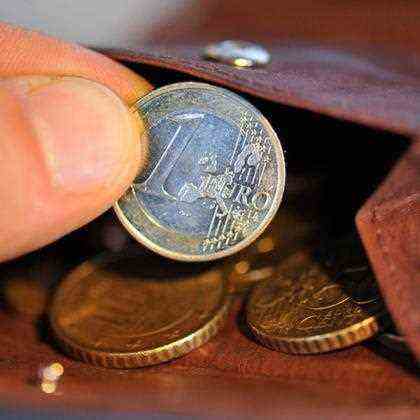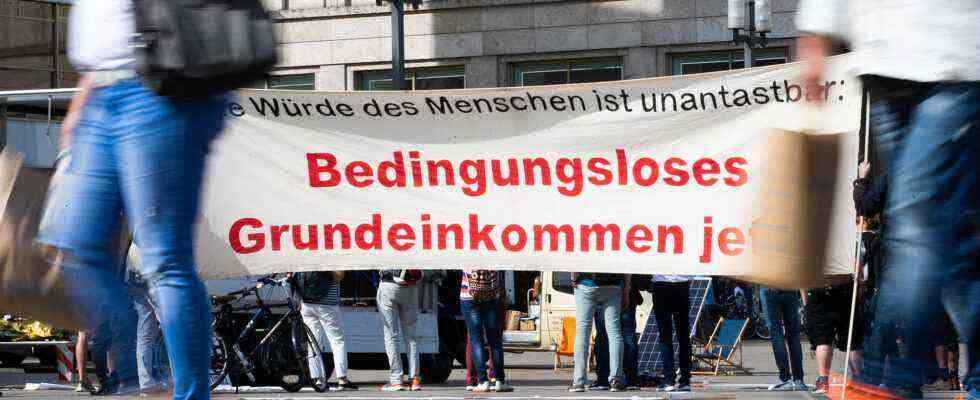Status: 01/30/2022 4:05 p.m
A fixed amount of money every month without conditions – that’s the idea of basic income. Supporters expect a self-determined life, critics fear more poverty. Now a study is to examine the concrete consequences.
At the age of 28, Sebastian Sittinger achieved what many dream of. After his studies he founded his own cooperative. But it is also true that he had help – in the form of 1000 euros a month. He received his basic income for six months from the “My Basic Income” association. “I would have founded the cooperative without the money, but of course it means that you can set it up without any worries,” says Sittinger.

Basic income and basic security – what are the differences?
Both the basic security – also known as citizen money – and the basic income are intended to reduce bureaucracy in the social system and replace unemployment benefit II (“Hartz IV”). The main difference between the two is the means test. This remains with the basic income, it would be eliminated with the basic income. In addition, the citizens’ allowance continues to provide for sanctions. Recipients must, for example, actively participate in the job search, otherwise there is a risk of sanctions – in line with the previous Hartz IV principle of “support and demand”.
Basic income as a raffle
An experience shared by the club. Launched in 2014, it has already given away over 990 basic income prizes. Donations are collected via crowdfunding. If 12,000 euros are in the pot, the money will be paid out as a basic income. “For example, we found that people don’t work less when they get the money. Instead, they find jobs that suit them better. That can lead to more work ethic and productivity,” says the founder of the association “My Basic Income”. , Michael Bohmeyer.
In order to raise these previous findings to a scientific level, a large-scale study has been underway since last year. The German Institute for Economic Research (DIW) and the association want to examine the effects of the basic income on society over a period of three years. The Vienna University of Economics and Business is also involved. Susann Fiedler is a professor of economics and psychology there and accompanies the project. “Various studies from other countries show that it also has an effect on further training and innovative strength. We now want to find out what it’s like in Germany,” says the scientist.
A question of design and financing
Bohmeyer and Fiedler are of the opinion that the basic income will lead to more justice. The money would be redistributed, the rich would not get more, would instead finance the basic income for the poor through taxes. Much, of course, has to be considered politically.
The political scientist and poverty researcher Christoph Butterwegge, on the other hand, fears that the basic income is not fair. He expects the consequences would include an even broader low-wage sector. “If everyone gets 1,000 euros, an entrepreneur only has to pay a little more to make the job attractive for many people.” In addition, the welfare state would be dismantled when the basic income was introduced, because both would not be financed together. “Especially those in need of protection, such as people with disabilities, would be more disadvantaged than before by a social policy based on the watering can principle,” criticizes Butterwegge. The political scientist also complains about the high costs of the project – according to Butterwegge, they are between several hundred billion and more than one trillion euros a year.
Parties with different positions on basic income
At least the parties have taken up the issue of basic income in their programs. While the CDU and SPD want little to change the existing system, the left and the Greens have adopted essential elements of the basic income. The left writes of a so-called “minimum security” that provides for a sanction-free minimum income of 1,200 euros. However, the party insists on a means test.
The Greens, in turn, support projects to research basic income. Your proposal of energy money as an unconditional payment to everyone comes close to the idea of a basic income. The AfD does not have a precise position on this. However, no party formulates demands and ideas that are too precise. There is simply a lack of knowledge and the effects of basic income on society.
First results in the coming year
The first results of the scientific study on basic income are expected next year, halfway through the experiment, so to speak. Then, the experts hope, the discussion about the unconditional basic income can be less ideological and all the more objective. Because until now the arguments – for or against – have always been on a theoretical level. There is no really usable data.
In contrast, the effects are very practical for Sebastian Sittinger. Thanks to the basic income, he was able to stay in Saarland and do what he wanted without moving away. Surely he would have achieved that even without the money. But this way he was able to act more courageously, as he says – and take “more risks”.

